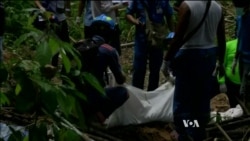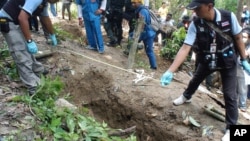Thai authorities have announced the arrests of four men believed to be connected with a network responsible for trafficking scores of people through the country in recent years. They say the detained include three Thai citizens, who are officials in Sadao district, a rural area bordering Malaysia where police last week found a mass grave with 26 bodies in it. An ethnic Rohingya from Myanmar is also in custody.
In addition to the arrests, officials Tuesday said they have found at least one other suspected human trafficking camp near the Malay border, along with what appears to be five more graves.
Call for speedy investigation into deaths
In Washington, U.S. officials called for a speedy and credible investigation into the deaths, most of whom are believed to be ethnic Rohingya Muslims from Myanmar. In recent years Rohingya have been fleeing persecution in Myanmar, often braving long sea voyages to escape. Human rights groups say Thailand has done little to stop human traffickers from seizing and holding the migrants for ransom.
“These camps are in fact surrounded by local officials and communities taking money from the traffickers and at more senior levels, say at the provincial level we have officials looking the other way,” said Phil Robertson, deputy director of Human Rights Watch's Asia division.
In response to rampant corruption, desperate civilians have formed militia patrols to drive the traffickers away from their villages - often just kilometers away from tourist beaches.
With government permission, these squads have had some success in rescuing small groups of mostly Rohingya migrants, but their experiences show the enormous challenges against the deep-rooted gangs.
Enforcement remains a challenge
“We can’t make trafficking stop but at least slow them down. It not like the past. In the past the broker moved 40 or 50 Rohingya each time but now they break to smaller groups, like 10 or 20 each time,” said militia leader Cherdchai Papattamayutanon.
“It makes it more difficult for us to catch them.”
Harrowing stories from the sea
Rescued victims tell stories of long waits aboard vessels off the coast of Thailand, with traffickers timing the trip ashore to evade detection.
At a shelter near the popular tourist destination Phuket, 11-year-old Rohingya boy Nay Zomo Ding tells a familiar tale.
“I suffered on the boat for a month before we arrived in the mountains. When I was in the boat, the broker gave me fish in a can. I couldn't eat it. I want to vomit. I saw two men shot by the brokers. I saw another man dead on the boat.”
Last year, U.S. authorities downgraded Thailand to the lowest level for its efforts in combatting human trafficking. But the latest finds indicates the problem could be even worse than officials feared.






